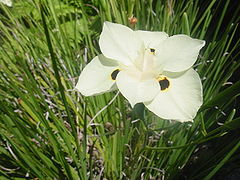Dietes bicolor: Difference between revisions
Jump to navigation
Jump to search
No edit summary |
No edit summary |
||
| Line 1: | Line 1: | ||
{{SPlantbox | {{SPlantbox | ||
|familia=Iridaceae | |||
|genus=Dietes | |||
|species=bicolor | |||
|common_name=Wild iris, African iris, Fortnight lily | |common_name=Wild iris, African iris, Fortnight lily | ||
|habit=bulbous | |habit=bulbous | ||
| Line 11: | Line 14: | ||
|lifespan=perennial | |lifespan=perennial | ||
|exposure=sun, part-sun | |exposure=sun, part-sun | ||
|water= | |water=infrequent | ||
|features=evergreen, flowers, drought tolerant | |features=evergreen, flowers, drought tolerant | ||
|flower_season=early spring, mid spring, late spring, early summer, mid summer, late summer | |flower_season=early spring, mid spring, late spring, early summer, mid summer, late summer | ||
| Line 20: | Line 23: | ||
|image=Fortnight Lily.jpg | |image=Fortnight Lily.jpg | ||
|image_width=240 | |image_width=240 | ||
|min_temp=°F | |min_temp=°F | ||
}} | }} | ||
Revision as of 15:23, 23 October 2009
| Dietes bicolor subsp. var. | Wild iris, African iris, Fortnight lily | |||||||||||||||||||||||||||||||||||||||||||||||||||||||
|---|---|---|---|---|---|---|---|---|---|---|---|---|---|---|---|---|---|---|---|---|---|---|---|---|---|---|---|---|---|---|---|---|---|---|---|---|---|---|---|---|---|---|---|---|---|---|---|---|---|---|---|---|---|---|---|---|

|
|
| ||||||||||||||||||||||||||||||||||||||||||||||||||||||
| ||||||||||||||||||||||||||||||||||||||||||||||||||||||||
Dietes bicolor (variably known as African iris or Fortnight lily) is a clump-forming rhozomatous perennial plant with long sword-like pale-green leaves, growing from multiple fans at the base of the clump.
Cultivation
Propagation
Pests and diseases
Species
Gallery
If you have a photo of this plant, please upload it! Plus, there may be other photos available for you to add.
-
photo 1
-
photo 2
-
photo 3
References
External links
- w:Dietes bicolor. Some of the material on this page may be from Wikipedia, under the Creative Commons license.
- Dietes bicolor QR Code (Size 50, 100, 200, 500)
